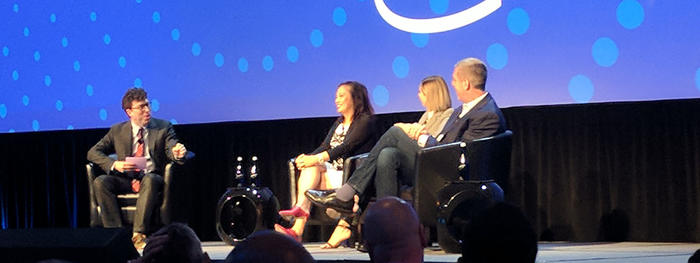Dell Technologies World 2019: What Will 5G Really Mean for Businesses and Consumers?
The age of 5G is upon us, and predictions for what it can actually deliver to businesses and consumers often amount to a buzzword bonanza. The question remains: What use cases will the faster wireless speeds actually enable?
This the question that a panel of experts, artists and futurists sought to answer at the Dell Technologies World conference in Las Vegas on Tuesday.
For starters, the technology is likely to have more of an impact on how businesses function and build products and solutions because, according to Caroline Chan, vice president of Intel’s Data Center Group and general manager of its Network Business Incubator Division, 5G was built to cater to enterprise needs as well as consumers.

From left: Jonathan Zittrain, George Bemis Professor of International Law at Harvard Law School; Caroline Chan, Vice President, Data Center Group; General Manager, Network Business Incubator Division; Eliza McNitt, Writer and Director; and John Ellis, Founder & Managing Director, Ellis & Associates speak at Dell Technologies World 2019.
“The previous generations were built for consumers,” said Chan, meaning that with 3G and 4G, commercial telecoms were unable to truly provide businesses with the wireless bandwidth necessary to scale up operations at will. “But 5G was built from the ground up with the idea that you must be able to serve multiple verticals. It’s multipurpose.”
MORE FROM BIZTECH: Check out how 5G will change data centers for good.
How 5G Could Change Industry
There’s much to do about how 5G’s high reliability and low latency wireless connectivity will enable Internet of Things devices, but it’s difficult to grasp exactly what that might mean for how we approach experiences, industries and data.
“One of the biggest benefits of 5G is the ability to suffuse wireless connectivity into anything,” said John Ellis, founder and managing director of Ellis & Associates. “You can give voice to cars, carpets, seats … to infuse communication into thread.”
He predicts that we’re moving into a world where it will be “almost impossible to build anything that does not … communicate.”
This means being able to understand and cater to differences in each customer’s journey with a product. But truly taking advantage of that capability will require reimagining how products are built and used.
MORE FROM BIZTECH: Check out how VR and AR will change the future of corporate training.
How 5G Could Expand Art and Media
It’s not just tech companies or huge enterprises that stand to gain from 5G; media and art stand to gain from the capabilities it enables as well.
Case in point: panelist Eliza McNitt, an artist and writer who is working on a project to bring narrative and experiential storytelling to virtual reality. In her quest to develop a VR experience that takes viewers through the cosmos, she has sought to expand what’s possible in VR, which required no small amount of computing and processing power.
Having seen the impact of what improved processing power can do to create images and connections, McNitt stresses that 5G can help the art of storytelling go one step further to continue connecting people to places and to each other in unprecedented ways.
“It’s incredibly exciting to imagine these futures where we can step into an experience and … not just be in that world, but experience it with multiple people, with hundreds of thousands of people around the world who you can come into that experience with together,” said McNitt. “I see the opportunity to connect the world through storytelling.”
Keep this page bookmarked for stories from the BizTech team. Follow @BizTechMagazine on Twitter, or the official conference Twitter account @DellTechWorld, and join the conversation using the hashtag #DellTechWorld.









